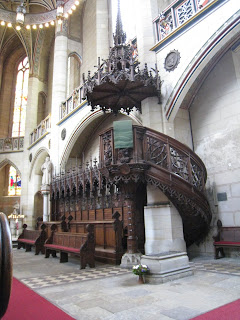
What did we know about passes when we left Ampezzo this morning? We left after a nice breakfast of croissants the owner of the Albergo baked fresh for us. We have perfect weather, 21 degrees and bright sunshine.
After a while we run into road work where the asphalt has been milled off the road surface and only the harsh grooves remain for us to ride over. Some areas are already tarred for new paving but the road is open for traffic. Signs warn us of debris on the surface, too. After riding through the tar (we could not do otherwise) we pick up small stones on our tires. This makes for a weird ride when going around curves. Not only do we get a strange wiggle sensation from the grooves milled into the road, but now we feel like we are riding with pop corn tires too
 the road is carved into the mountain side with twist and turns.
the road is carved into the mountain side with twist and turns. Paseo de Mauria is the first section for the day and a hard section to ride. We thought the road was fairly straight, judging from the map. But we get through it and are looking for a little relief with a straight section. No such thing today.
The next Pass is Falzaregopass and it is like a screw driver. I remember one curve in particular. A right hander, tight, first gear and as soon as I made the right turn, the road climbed immediately after the turn. It had kind of a bump in the road, right after a sharp turn. Only with lots of gas did I make this turn.
 Next was the Pordoi Joch, another beauty. Carol and I just looked at each other and you could tell we were both not happy with so many of the twists. These constant hard sections will wear you out. Your arms hurt, your shoulders cramp up, your neck is strained from twisting your head all away around all day. And yet, here comes the Sella Joch.
Next was the Pordoi Joch, another beauty. Carol and I just looked at each other and you could tell we were both not happy with so many of the twists. These constant hard sections will wear you out. Your arms hurt, your shoulders cramp up, your neck is strained from twisting your head all away around all day. And yet, here comes the Sella Joch. It is now about 2.40 in the afternoon and with the warm sun, the bright light, the high elevations, and the constant strain on our nerves we are worn out. We have had it for the day. There was no lunch today, just water breaks and this town Wolkenstein has so many hotels that we will find one with a Wi-Fi someplace. We call a few hotels from a telephone board set up by the town, but no luck. We stop at 4 ort 5 places to just walk in but no internet. We wait for the Information Booth to open at 3 pm and they do help in printing out a list of hotels with Wi-Fi and we call all of them. No luck, they have no Wi-Fi, they might get some down the road, but they don’t have it yet. It is now 5 pm and we have had it. Back to the first place we found which looked clean and had a room and just breakfast. We took a room here.
Today we feel like we got beaten up by the mountains and then again by our hotel search. The roads got to us. We did everything right, nothing bad happened but we are bushed. These passes are something else, they don’t quit. They keep on coming up on you and twist and twist and so on. No mercy here, ride or else. There is no way out, we must ride out of these mountains even though we will land in other sections of the Alps but tomorrow is another day





























